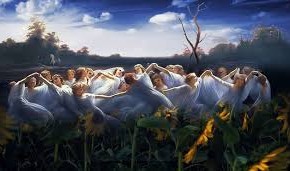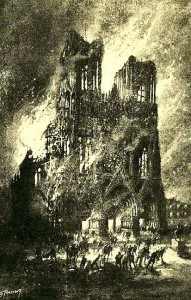Welcome, readers, to July’s issue of Synchronized Chaos International Magazine. This month we find ourselves asked to dance.
We begin with the gentle invitation of Michele Johnston, whose poetic speaker imagines joining in with the scenes unfolding outside her window.
As we begin to move with the push and pull of life, we often first observe what’s happening. This process doesn’t have to be passive, and can involve great concentration. A speaker in Jim Davis’ first set of poems cleans and denudes his mental environment to have space to listen to the world around him, and later finds himself asserting his existence through quiet thought. Other poetic work, from Jim Davis and Tony Longshanks le Tigre, involves small intellectual vignettes where the writers have noticed and meditated upon aspects of our existence.
Seeing and considering what is actually going on in front of us is important. Virginie Colline, in her short poem, suggests the danger of getting so caught up in one’s imagination that one does not pay attention to reality. Memorialized in her poetic subject’s tattoo, Ophelia and Hamlet both met tragic ends. Sometimes we need to follow whatever music is playing in our lives, even if we would prefer a different tune.
Thoughtful observation, although a crucial first step to understanding life, is often not enough to forestall chaos and brutality. In a dramatic sketch, Christopher Bernard laments that even the intellectual and philosophical achievements of Europe, the heights of their creative imaginations, could not prevent them from descending into the depths of World War I.
Sometimes we just react, struggling to keep up with life’s steps and movement. Christian Sorensen’s poetry includes a speaker who responds in staccato bursts to the world’s imperfections, from air raids to his lost keys. Hannah White’s speaker stumbles over a whole list of thoughts, wondering how to connect to herself and others in a healthy way without arrogance.
As we become more confident, we begin to respond more actively, at times taking the lead. Evan Almon’s protagonist in “Life after Bungee” leaps out to overcome his fears. Ayokunle Adeleye urges his fellow Nigerian entrepreneurs to cling to their principles rather than abandoning ethics in the pursuit of cash, and his fellow young compatriots to work hard, study and live within their means. Elizabeth Hughes’ Book Periscope column presents a mixture of action and thriller novels and memoirs written as suspense narratives. Her column suggests that we can become heroines and protagonists in the daily dramas of our lives, make something out of even the challenging experiences.
Sometimes we can even anticipate life’s larger twists and turns. As Oakland astronomer Gerard McKeegan’s recent lecture, reviewed by Cristina Deptula, demonstrates, we are starting to be able to find and deflect asteroids headed for our planet. Through diligent research and its application, researchers hope we may delay the end of life as we know it.
Societies, as well as individuals, can choose steps that protect and affirm their members and allow everyone to move forward towards positive goals. As Mary Mackey discusses in her interview with our staff concerning her new poetry collection Travelers with No Ticket Home, Brazil is a beautiful country facing significant challenges, but where the standard of living has steadily improved in recent years. Linda Baron-Katz’ memoir Surviving Mental Illness: My Story, reviewed by Holly Sisson, reflects the moral and psychological support she at last received from her traditional Jewish faith and community as she obtained a diagnosis and treatment. Joe Klingler, in an interview with our staff, brings home the point that the technologies he describes in his suspense novels RATS and Mash Up can be developed for war and destruction or the betterment of civilization. Our music sharing, smartphones and computers can separate or connect us, depending on how we choose to use them.
Life, at times, takes us on unexpected backflips. Poet and novelist Mary Mackey describes finding a vampire bat in her sleeping bag on a Central American camping trip. There are also more painful steps backward, such as the loss of love related by Kamila Bogedal’s poetic speakers. She captures the self-loathing and nausea of rejection along with the grief and loneliness.
There is danger in stasis, in standing still and flat footed, even during the most unpleasant movements of life’s dance. An element of the suffering in several pieces comes from the dreary sameness of difficult situations, from being stuck for one reason or another. Hannah White’s pieces depict the weariness of chronic illness, showing the repetitive cycle of feelings and hospitalizations of a patient with an eating disorder. Evan Almon’s short story “The Sound of Loathing” comes from the point of view of a young child hearing his parents’ continual, unresolved arguments. Powerless in that situation, he reflects the harshness of the situation by painfully biting his nails. In another Almon piece, “The Gauntlet,” the protagonist gets humiliated and injured in a fraternity initiation that goes too far. Although he is old and strong enough to leave, he stays, out of determination not to feel or look weak to the group.
Finding ways to follow the dance, wherever it leads, can help us to stay on our feet. In Christian Sorensen’s final poem, “My Imperfect Car” he affirms his acceptance and even affection for his old and somewhat broken vehicle. In Elsie Augustave’s novel The Roving Tree, reviewed by Leah Dearborn, the lead character Iris follows her heart and travels to Zaire, where she is able to learn more about her heritage. Although her experience there is complex and not totally positive, she makes strides towards creating a life that makes sense for her.
We hope that these submissions will inspire you to leave your seat and join the dance! Whether you are experiencing a ballet, a tango, a foxtrot, a square dance, a jive or a rumba, you have steps and turns to add to the scene.
** Announcement: Thursday July 10th will be our next reception event, from 6-9 pm at Berkeley Espresso (corner of Haste and Shattuck, near BART). Feel free to come and chat with other creative types, bring work to share or books to sell, or just bring yourself. RSVP encouraged but not required. Here’s the invite page: https://www.facebook.com/events/578554668926919/
- From Patheos.com
- From polyvore.com
- From pdimages.com




